- Home
- Charles de Lint
Angel of Darkness
Angel of Darkness Read online
Angel
of DARKNESS
by Charles de Lint
from Tom Doherty Associates
Angel of Darkness
Dreams Underfoot
The Fair in Emain Macha
Forests of the Heart
Greenmantle
Into the Green
The Ivory and the Horn
Jack of Kinrowan
The Little Country
Memory and Dream
Moonheart
Moonlight and Vines
The Onion Girl
Someplace to Be Flying
Spiritwalk
Svaha
Trader
Yarrow
Angel
of DARKNESS
CHARLES
DE LINT
WRITING AS
SAMUEL M. KEY
A TOM DOHERTY ASSOCIATES BOOK
NEW YORK
The author and publisher have provided this e-book to you without Digital Rights Management software (DRM) applied so that you can enjoy reading it on your personal devices. This e-book is for your personal use only. You may not print or post this e-book, or make this e-book publicly available in any way. You may not copy, reproduce or upload this e-book, other than to read it on one of your personal devices.
Copyright infringement is against the law. If you believe the copy of this e-book you are reading infringes on the author’s copyright, please notify the publisher at: us.macmillanusa.com/piracy.
This is a work of fiction. All the characters and events portrayed in this novel are either fictitious or are used fictitiously.
ANGEL OF DARKNESS
Copyright © 1990 by Charles de Lint writing as Samuel M. Key
All rights reserved, including the right to reproduce this book, or portions thereof, in any form.
Book design by Mark Abrams
An Orb Edition
Published by Tom Doherty Associates, LLC
175 Fifth Avenue
New York, NY 10010
www.tor.com
Library of Congress Cataloging-in-Publication Data
De Lint, Charles, 1951–
Angel of darkness / Charles de Lint.—1st Orb ed.
p. cm.
ISBN 0-312-87400-6
I. Title.
PR9199.3.D357 A54 2002
813'.54—dc21
2002066313
This book was originally published by Jove Books in October 1990 under the pen name of Samuel M. Key.
Printed in the United States of America
0 9 8 7 6
for Sean & Carole
and for those
men and women of the OPF
who give their all
and then give some more
INTRODUCTION
Sometimes the darkness calls, and I find myself approaching it. Not because it has any sort of appeal to me, but to try to understand it.
One of the ongoing themes of my work is the effect that preternatural encounters have on the ordinary person. Mostly, the darker sections of my novels arrive from the human psyche, with the magical elements playing against the shadow. But the Otherworld contains as much darkness as it does ambiguity and light, and to ignore it entirely strikes me as only telling half the story, hence the books I wrote under the pen name Samuel M. Key.
Angel of Darkness originally had a working title of The Killing Time, and it wasn’t a book I enjoyed writing—its shadows held on too long after the day’s work at the keyboard was done—but I felt compelled to write it all the same. There’s no other reason to write a book, as far as I’m concerned. If you’re not compelled to tell the story at hand, you should put it aside and find one that does compel you.
When my first “horror” novel, Mulengro, appeared in 1985, readers picked it up expecting the usual de Lint novel. Mulengro has many of the elements that readers have come to expect in my work, but it also contains somewhat graphic descriptions of violence and its aftereffects, which some readers found disturbing. I can well understand that some people prefer not to read horror fiction, so one of the reasons I decided to create “Samuel M. Key” was so that readers could differentiate between the types of fiction I was writing. The Key books would be the darker ones. No secret was made of the fact that the pseudonym was mine, since it was merely a device to let readers know in advance that they could expect a darker story between the covers.
If you’d like to know more of the origins of Sam Key, please visit my Web site at www.charlesdelint.com/faq.htm.
The Sam Key books are dark, and at times, graphically rendered novels, Angel of Darkness more so than the others. Though ultimately they reach for the light, the journey to get there becomes both arduous and harrowing in places. Much like life itself, really, reminding us to take care of each other along the way.
—Charles de Lint
Ottawa, Spring 2002
Angel
of DARKNESS
No man is an island, entire of itself; every man is a
piece of the continent, a part of the main . . .
any man’s death diminishes me.. . .
—John Donne
What’s one less person
on the face of the earth anyway?
—Ted Bundy
A WITCHES’ BREW of sound.
The vocalization of every hurt, every pain that could be experienced, was digitally stored in the computer’s memory banks, brought to a boil by fingers dancing across a keyboard. VU meters burning into the red. Disk drives humming. Software restructured from a hundred mistakes until it reached its final, perfect, almost occult program. The matrix taking shape inside the hardware, circuits brought into play, one after the other in ordered sequence.
The sounds that lay in wait, that needed only one flick of a switch to burst from the speakers, had never before existed in precisely this configuration. No one had dared to harness these pains, these cries of hurt and terror before. Their precise pattern, the matrix of their interrelationship to each other, should have remained impossible to uncover.
But he had.
And he knew it worked.
He was sure it would work this time.
It was a simple given that one reasoning individual, unbound by the social restrictions fettering other experimenters, could conceive of how to use these sounds. Could undertake the labor to interface them with the correct programs. Could bring to fruition an experiment of which others could barely conceive.
There was power in sounds.
Sounds could heal.
Sounds could kill.
This time he was sure he’d succeeded.
The last girl had given him everything he’d needed, from her first screams of terror to her final burbling moan, as what remained of her life fled from between her skinned lips.
He leaned back in the swivel chair, turning from the array of computer and sound equipment. A flick of a switch set hydraulic motors working, and a section of wall rolled aside on oiled bearings to reveal an expanse of dark glass. Another switch brought the room behind that soundproofed glass into sharp focus. He put his hands behind his neck and leaned farther back in his chair, surveying his handiwork.
She’d lasted the better part of a day and a half.
It was her youth.
Youth’s resilience.
She had come to him for experience, as others did from time to time. Most he never touched. He only played the kindly father figure for them. He was there when they needed someone. The other half of the basement—the genuine sound studio half—was where they congregated to practice, where he made their demo tapes for them and gave them the expertise of a lifetime spent in music.
The kindly father . . .
But sometimes he kept one. To feed the program.
To give the software a human voice. Play a high C on the keyboard, and it came forth from the speakers in a human voice, shrill with pain. Combine it with other notes, and chords of agony came forth. A music of terror. A music that could wake the dead. A music that could kill. A music that could enlighten. His music. Created with his program. From terror and pain.
Not all the collected sounds in the memory banks had come from those who had died in that small chamber. There was genuine singing built into the matrix—dozens of young voices that had sung out their hearts in his studio, hoping for the big break. He’d left them untouched, except for the tiny part of their souls that was digitally stored in the memory banks. There was the sound of mothers in childbirth, sounds acquired at the scenes of fires and accidents, sounds recorded in asylums and hospitals. Once he’d kept a madman screaming for a week in that small black room, screaming until his voice finally gave out.
But this last girl. . . surely she’d given him the most.
He looked at what was left of her, strapped to the metal operating table. Electrodes sprouted wires that ran to an EEG machine and various monitoring systems. IV tubes sank into her veins. Some carried nourishment, others dispersed drugs to heighten the sensitivity of her nerve endings. A microphone hung above her head. Others were attached to the muscles of her neck. Still more had been drilled into the bone near her ears.
It smelled like a slaughterhouse in there, but the stench was a sweet scent to him. The slightly metallic narcotic that was blood. It was true that at first she’d loosed all that her bowels and kidneys held. But that was easily cleaned. And then she was empty. Purified. And then all that remained was the smell of her flesh. And her blood.
What lay on the surgical table resembled a human being only in its shape. A doctor would recognize the musculature, bared to the air by the removal of her skin. But most viewing that shape would see only some monstrous thing out of their darkest nightmare. While he . . . he saw the sweet completion of his work.
He flicked on display screens, one after another. Their computer-generated roiling swirl of colors was the closest he could personally come to experiencing his program without personal risk.
But if he was to engage this one switch ...
(He needed a suitable subject.)
. . . the sound that would come from those speakers , . ,
(There was only one suitable subject.)
But he didn’t dare. The true scientist never experimented on himself. It simply wasn’t ... objective enough. The sound .. .
It might kill.
Or it might enlighten.
It would certainly irrevocably change the subject.
Forever.
Death was permanent. As was enlightenment.
He toyed with the switch, his gaze moving from the display screens, where his program pulsed as though to the rhythm of his own heartbeat, to the room where the girl had been slowly skinned.
He had lost count of how many had given him their all. Would it be fair to them, to the sacrifice they had made, for him to retreat from this moment?
He leaned closer to the glass separating the girl’s body from his control room. Her sightless eyes, the eyelids cut away, appeared to mock him. He lacked courage, they told him. He could bring pain, but could he dare it himself? Knowing what he did—like a coin toss, madness leading to death on one side, enlightenment on the other—how could he not chance the final step himself?
Who was more deserving?
There was power in sound. A certain note could bring uneasiness, a series of them fear, others happiness. Or healing. Or peace. And somewhere, in that complex pattern between eighty-five and eleven hundred cycles per second that was man’s range of emission reception, it was waiting for him. The final matrix of his program. He could feel the auditory cortexes on either side of his brain humming in anticipation.
Did he dare?
How could he not?
Amplitude, frequency, and wavelength, fine-tuned to perfection. Digital ghosts awaiting one simple movement of his fingers . . .
Thumb and index finger tightened on the switch. He gave the sightless eyes of his last victim a quick smile. He flicked the switch.
At first there was no change.
His gaze went to the swirling patterns still undulating across the display screens.
And then he heard it. A pure tone, simple and stark, that set up a sympathetic vibration in his skull. A harmony rippled across it and the ossicles of his middle ear vibrated to its rhythm, sending the sound to his inner ear. His vision grew unfocused. The room spun with the same pattern that moved across the displays. Then his eyes rolled upward and he saw only a void as the matrix spilled its brew throughout the room in a sudden flood of sound.
The pleasure centers of his mind ached with sensation.
Between his legs, his penis grew stiff as a steel rod, pressing painfully against his pants. He clawed at his fly to release it from confinement. Freed, his penis vibrated like a tuning fork. His testicles became two tiny, hard rocks as his scrotal sac drew up tight against the base of his penis.
He was aware of every object in the room and his relationship to it by a sense of echolocation that made his entire body a receptor of sound. The sounds . . .
A woman in labor.
A madman’s howling.
A child’s pain as the skin was cut from her, piece by bloody piece.
Made into a music that had no known counterpart.
His back arched in the chair and he was allowed one brief lucid moment. He saw the room through a smoky haze. He smelled the acrid stench of frying circuitry, melting cables, burning plastic. He saw the skinless face of his last victim while the displays pulsed in his peripheral vision.
Then something began to take shape between the glass that separated his victim from him and the chair in which he sat. It coalesced slowly, from a bewildering spin of shapeless mist into a young woman’s face. She floated on the air before him—a vision as perfect as the music, clothed in filmy white cloth as tattered as a child’s helpless cries.
She was an angel of sound.
The soul of the music given a moment of human form.
Her lips moved and he yearned for their touch. Slowly she drifted toward him, long, pale hair streaming behind her. His gaze locked on hers—eyes so deep, they could hold oceans. Her face was inches from his before she began to change.
The skin peeled away from her face. Fangs protruded from her once perfect lips. The flesh and cartilage of her nose disappeared, leaving a hole in the middle of her face. He began to scream as her mouth opened—wide, wider, jaws unhinged like a serpent’s as they spread. A multitude of tongues wriggled in that dark hole.
She was no angel now—unless it was an avenging angel.
A fury.
The music swelled and swallowed his scream. The control room disappeared and he found himself on a vast plain. A gray wasteland of unending bleak vistas spread in every direction. The skies were smog yellow, heavy with an unpleasant salty stench. Leafless trees reached with limbs like fingers to claw at the sky. Inches from his face, the horror still floated, dead gaze locked on his own, mouth alive with its writhing tongues.
And then she breathed on him.
It was fire.
He had time to lift one hand, to see the flesh and muscle and nerve tissue burn away to its skeletal marrow.
Then the fire burned his face away and his soul was torn loose to flee naked across the wasteland.
In the control room he was dying.
He was dead before his body crumpled from the chair. But he lived on in the wasteland. A part of the horror; apart from it.
In the control room the figure spun slowly in place in the center of the room, her shape dimming as one by one the various speakers continued to melt. She floated over the corpse he’d left behind with its head and right hand burned away to the bone. The screen displays exploded, shattering with such force that glass shards were embedded in the walls. The computers smoked. The win
dow between the control room and where the body of the young girl lay developed a web-work of cracks, then it, too, exploded. Acrid smoke lay thick and heavy in the room.
And still the figure spun.
Until the last of the music died in the last speaker.
Then she drifted away. Toward a wall. Passing through the molecules of solid matter as only sound can.
And then she was gone.
All that remained in the control room was the crackle of bare wires as they hissed and spat against each other before they burned out.
And then there was silence.
In the wasteland he screamed, still running naked across the plain, feet bloody, mind a ruin.
But that wasn’t a sound that carried beyond its borders.
This page intentionally left blank
ONE
1
JANET ROWE.
Pulling up in front of the house in his Toyota pickup, Jack Keller repeated the name to himself as though it were a charm. He’d never met her, but it was because of her that he was here. Killing the engine, he stared at the house. Unwelcome fears whispered in the back of his mind as he sat and studied the structure.
(He was already too late.)
Janet Rowe. Fourteen years old. Caught in that delusion of feeling mature beyond her years. Her mind told her she was an adult and knew exactly what she was doing. Family and social constraints told her otherwise. They explained, in less than understanding terms, that she had to wait for the magic ages. Sixteen, and suddenly she would be capable of driving a car. Eighteen, and she could leave home, vote, go into a bar and order a drink. Until then she had no status. She was to do what she was told, end of discussion.
Through his work Jack had come to the realization that all kids went through that period of confusion and questioning to some degree or another. The only thing that ever surprised him was why more of them didn’t hit the streets the way the few nervy ones did. But the problem with the streets was that there were no answers there, either. His years in plainclothes and uniform had taught him that long before he took this job.

 Widdershins
Widdershins The Ivory and the Horn
The Ivory and the Horn Yarrow
Yarrow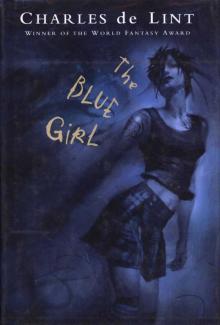 The Blue Girl
The Blue Girl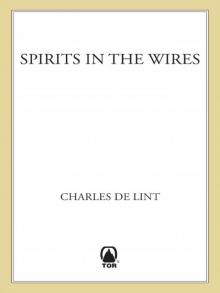 Spirits in the Wires
Spirits in the Wires The Painted Boy
The Painted Boy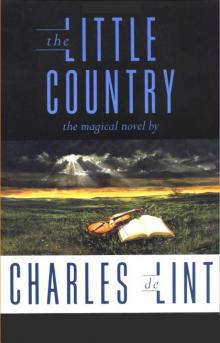 The Little Country
The Little Country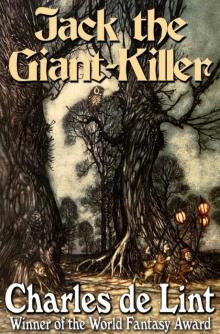 Jack of Kinrowan: Jack the Giant-Killer / Drink Down the Moon
Jack of Kinrowan: Jack the Giant-Killer / Drink Down the Moon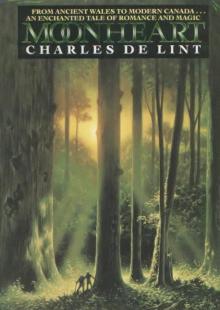 Moonheart
Moonheart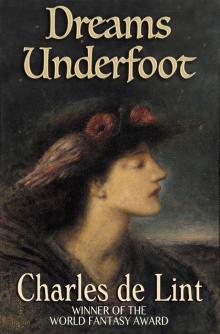 Dreams Underfoot
Dreams Underfoot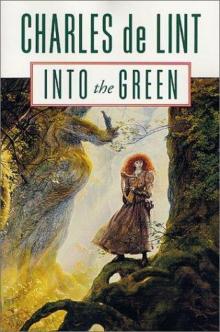 Into the Green
Into the Green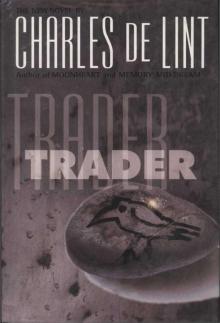 Trader
Trader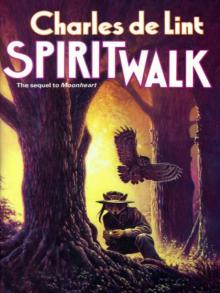 Spiritwalk
Spiritwalk Someplace to Be Flying
Someplace to Be Flying Jack in the Green
Jack in the Green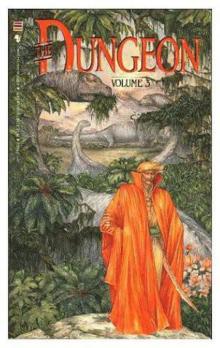 The Valley of Thunder
The Valley of Thunder Out of This World
Out of This World The Cats of Tanglewood Forest
The Cats of Tanglewood Forest Seven Wild Sisters
Seven Wild Sisters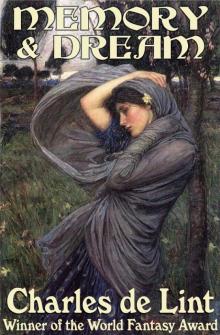 Memory and Dream
Memory and Dream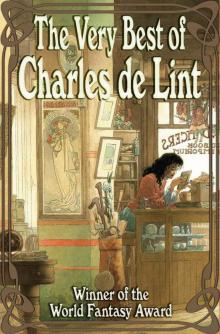 The Very Best of Charles De Lint
The Very Best of Charles De Lint Under My Skin
Under My Skin Forests of the Heart
Forests of the Heart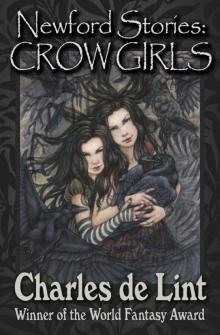 The Newford Stories
The Newford Stories Moonlight and Vines
Moonlight and Vines Angel of Darkness
Angel of Darkness The Onion Girl
The Onion Girl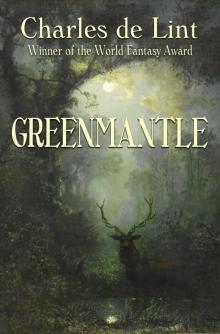 Greenmantle
Greenmantle Waifs And Strays
Waifs And Strays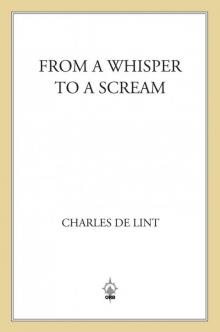 From a Whisper to a Scream
From a Whisper to a Scream Over My Head
Over My Head The Ivory and the Horn n-6
The Ivory and the Horn n-6 Our Lady of the Harbour
Our Lady of the Harbour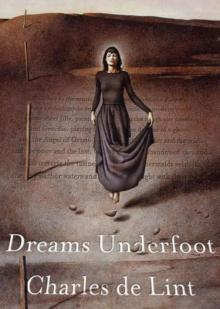 Dreams Underfoot n-1
Dreams Underfoot n-1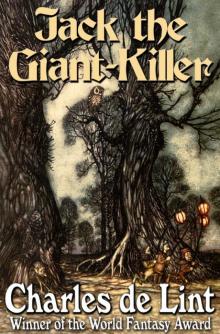 Jack the Giant-Killer (Jack of Kinrowan Book 1)
Jack the Giant-Killer (Jack of Kinrowan Book 1)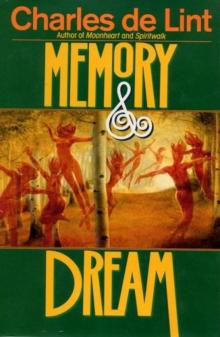 Memory and Dream n-5
Memory and Dream n-5 Under My Skin (Wildlings)
Under My Skin (Wildlings)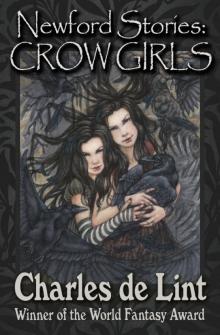 Newford Stories
Newford Stories The Wind in His Heart
The Wind in His Heart Ivory and the Horn
Ivory and the Horn